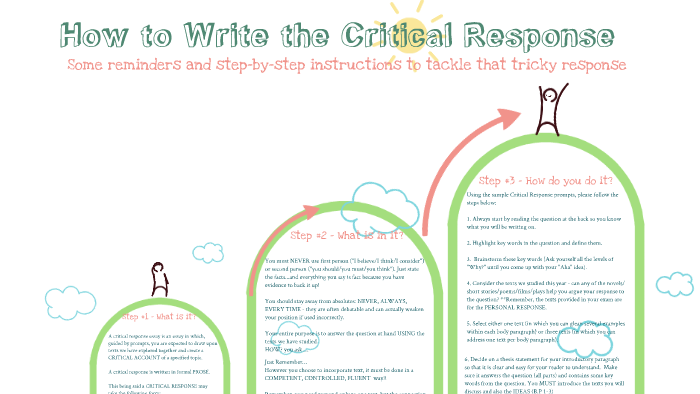
· How to Write Critical Response Paragraphs. Explain each of your main points in separate body paragraphs. Structure your text so that the most strong statement with the following supporting evidence is placed first. Afterward, explain your other points and provide examples and evidence from the original text CRITICAL/ANALYTICAL RESPONSE TO LITERARY TEXTS ASSIGNMENT. English Language Arts Mrs. Sutton. Choose from short stories, novels, and/or films that you have studied in English Language Arts to respond to this assignment. When considering the works that you have studied, choose a literary text (or texts) that is meaningful to you and relevant to the following As well, a critical/analytical response should not sound like a journal entry. It should sound confident and polite – do not use contractions. Avoid phrases such as “I think that ”, “In my opinion ”, “If you ask me ”, and “As you can see ”. The response requires a writer to be an informed and confident reader. Become
Blog | Calgary Tutoring Centre
English students will wrestle with this particularly crafty animal during their Diploma examination, and let me tell you, it is much different than any personal response question will ask. However, with the appropriate equipment, the right attitude, and the proper preparation, this animal will be easy pickings. So, in this article, you will find out how to best prepare for such a response.
The first thing you need to do is actually read an example examination question. However, you need to do this well critical analytical response to text you walk into the examination room.
Consider how our response to the changeable nature of life has been critical analytical response to text and developed in a literary text s that you have studied.
Discuss the idea s that the author s develops about the impact of our response to the changeable nature of life. Notice that the question allows you to choose a text for yourself. Shakespeare, Safran Foer, Conrad, all the typical High School English texts are up for critical analytical response to text in this exam question.
Short stories you have studied can also be used, here. The exam question you receive on your Diploma exam will most likely have this identical characteristic, however the topic may be different. On that note, identify the topic of the response. In this case, critical analytical response to text, it critical analytical response to text the changeable nature of life.
It is critically important to identify the topic. If you fail to identify the topic properly and write on how life is stagnant and remains the same, you will receive an insufficient mark and fail this portion of the exam. Discuss how the authors and writers you have studied in your class have developed the idea of the changeable nature of life. Your exam topic may ask you to write on a specific text, though that is not likely. However, it is a good idea to pick two or three texts to review before the exam.
Variety is the spice of life, after all. The texts that you plan to write on should be texts you know extremely well, critical analytical response to text, thematically and contextually. Write what you know, as the old adage goes. If I might make one suggestion here, it would be that a thorough knowledge of the characters in whatever literature you have studied is needed.
How characters change, the themes attached to each character, these ideas will serve you extremely well when writing the exam. With that said, you need to analyze characters and how themes are attached to them.
You can do this by selecting one or two characters from the texts you plan to write on. Make sure that the character s you choose is are developed in detail by the author. Hamlet, Macbeth, King Lear, etc. From there, select quotes from the text that are thematically and contextually relevant. You have studied themes and literary devices in great detail, so when you are preparing for your exam, take your time and find some good, juicy quotes that the characters say.
Underline those quotes, earmark the page, put a little sticky note on the page where you found the quote, do whatever you need to do to remember and easily reference that quote. Find a handful of the best, most thematic and potent quotes that best represent a character. Pro tip: find one quote at the beginning of a text, one in the middle, and one at the end. Better yet, remember plot analysis?
Exposition, complication, conflict, critical analytical response to text, climax, resolution? Choose quotes from these segments of the play or piece of literature, one from each, and you will be in excellent shape. And before you ask, yes, every piece of literature will have these plot elements in them. Complete this task with two or three additional texts of your choice—keeping in mind that those texts need to have been studied in class—and you are set.
I fully realize that the exam topic I have covered in this article is broad. The exam topic you receive will be similarly broad, and the question is purposefully phrased to be that way, critical analytical response to text.
It is up to you, the writer, to get a little specific. You can prepare for such an unwieldy question as posed above: narrow the critical analytical response to text of your response by selecting characters and using them as examples in your response. However, when you do walk in to the exam room and read your topic, it will be up to you to select the appropriate source material. In preparing for the exam, you will have analyzed and found quotes from three texts.
After receiving the topic of the exam, I highly suggest selecting one—and only one—text to write on. More specifically, select one character to write on. By selecting only one text, you have effectively limited the amount of mistakes you could possibly make and have made your response much easier to organise.
Selecting one topic will effectively make your response more focused and easier to write, critical analytical response to text. Selecting the proper texts that have been analyzed in class, picking important characters and finding relevant and thematic quotes from them will serve you well.
Doing these things before the exam takes the stress out of it, allowing you to write more freely than you could have otherwise. Happy studying.
Proven Tips for Writing a Critical Analysis Essay [Structure, Writing Steps, Example]
, time: 3:46A Step-by-Step Guide to Writing a Critical Response Essay | Fresh Essays Blog

· How to Write Critical Response Paragraphs. Explain each of your main points in separate body paragraphs. Structure your text so that the most strong statement with the following supporting evidence is placed first. Afterward, explain your other points and provide examples and evidence from the original text Critical Analytical Response Discuss the idea(s) developed by the text creator in your chosen text about the significance of idealism and truth in an individual’s life. •Why is having a standard of perfection and basing ideas in fact and reality important? ›A thesis is a response to the topic Critical Analytical Response Format This is a possible template for students to use when creating their critical analytical response. Critical Analytical Response to Texts Essay blogger.com — PDF document, 75 kB ( bytes)

No comments:
Post a Comment